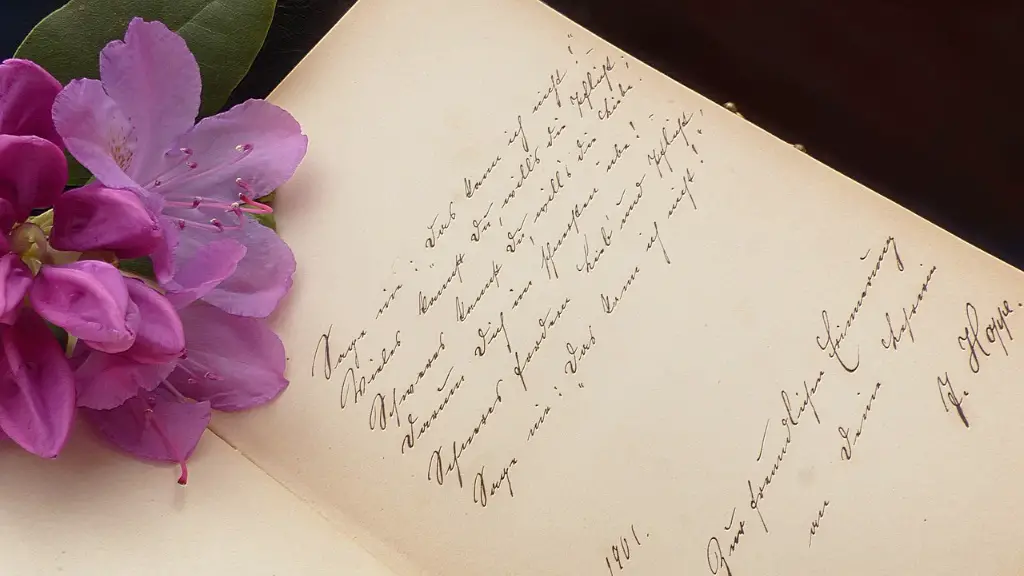1. What to Include in a Poetry Book
Writing a poetry book takes commitment and thought – it’s important to decide the type of poem that you want to include, and what themes you want to explore. A varied selection of poems in a poetry book will give it a good balance – there should be shorter and longer poems, contemporary and classic pieces, and poems exploring a range of themes.
Most poetry books contain works by a single author, which you may choose to include if you have written enough poems. If you don’t have enough poems, you can choose to include works by multiple poets, or you might even include a combination of your own work and the work of others.
In general, a full length poetry book should include between 40 and 100 poems. Of course, the exact number of poems you include will depend on their length and the publisher’s guidelines.
2. Criteria for Deciding What to Include
When selecting the poems that will appear in your poetry book, it’s important to be selective. It’s not enough to choose the first poems that come to mind – when assembling a poetry book, it’s important to make sure that the poems you select contribute to a common theme in some way, and that they make up a complete collection.
For example, if you’re writing a poetry book about nature, you might choose to focus on a particular type of landscape or environment, such as a forest or a desert. You might also choose to zoom in and focus on the plants, animals, and other elements of the selected environment.
Criteria for selecting poems for a poetry book may also include fitting a particular style or form. For example, if you’re writing a book of sonnets, then you’ll want to make sure that all of the poems included are written in the sonnet form.
3. Crafting Your Collection
It’s important to think about the structure of your poetry book as a whole. How will you order the poems? Will you order them chronologically, thematically, or alphabetically? Will you include an introduction, or a section of biographical information about your work?
Your collection should be created with a clear purpose and intent, and taking these considerations into account will help you craft a book that best conveys its message. For example, if you’re writing a poetry book about love, you may choose to order your poems according to the stages of a romantic relationship, from courtship to marriage to heartbreak.
Organizing your collection in this way will help you create a narrative arc, and allow your readers to follow the evolution of your theme in a structured way.
4. Editing and Refining
Once you’ve selected the poems that will make up your poetry book, it’s important to read through each of them individually to make sure that each poem meets the same standard and is original, fresh, and engaging.
During this process, it’s important to be mindful of the overall structure of your book, and think about ways in which you can edit, refine, and rearrange your poems to improve the flow and structure of your collection. For example, if you notice that a poem doesn’t fit neatly into your chosen theme or narrative arc, you may decide to omit it or replace it with something else.
It may also be useful to get feedback from friends and family, or to seek the assistance of a professional proofreader. Professional proofreaders can help you to identify any errors or inconsistencies in your work, and make sure that your work is up to professional standards.
5. Final Considerations
Once you’ve edited and refined your collection, it’s important to consider the format and design of your book in order to create a piece of work that is aesthetically pleasing.
You might choose to design the cover of your book yourself, or you can enlist the help of a professional designer. Additionally, if you’re publishing your book yourself, then you’ll need to think about any marketing and promotion that needs to be done in order to attract readers.
Finally, if you’re planning to submit your work to a publisher or enter it into a competition, then you’ll need to make sure that your work is up to the necessary standards and follows any guidelines set out by the publisher or competition.
6. Self-Publishing
If you’d like to take full control of the production and publication of your poetry book, then self-publishing is a great option. There are lots of services available for self-publishing your work, and it can be a great way to get your work out into the world without relying on the approval of a publisher.
When self-publishing, you’ll need to think about the cost of publishing, the marketing of your work, and the design and formatting of your book. It’s important to invest time and money in ensuring that your work looks professional, as readers will be more likely to purchase your book if it looks good.
7. Prices and Profits
When publishing your poetry book, it’s important to consider the prices and profits involved. When submitting your work to a publisher, you may be offered an advance and a royalty rate. If you’re self-publishing, then you’ll need to think about the cost of printing and distributing your work, and the pricing structure you’re going to use.
It’s important to set a price that is competitive but will also allow you to make a profit. It’s also worth doing research into the average cost of book production and distribution to make sure that you’re not underpricing your work.
8. Book Reviews
Good reviews are important for any book, and it’s worth considering how you’re going to promote and market your work in order to get the best reviews possible. Book reviews can come from a variety of sources, such as literary publications, book critics, and readers that you contact directly.
Social media and blogging can also be a great way to promote and market your work, and to encourage people to read and review your work. Establishing a good online presence can be a great way to get your work noticed and the attention of editors and publishers.
9. Choosing a Publisher
If you’re considering submitting your work to a publisher, then it’s important to choose the right one. It’s worth doing research into different publishers and thinking about which one is best suited to your work.
When choosing a publisher, it’s important to consider their track record and the quality of their work. It’s also worth looking for a publisher that is willing to invest time, energy, and money into your work, and to promote it to the wider literary world.
Additionally, it’s worth taking a close look at the contract offered by the publisher, and making sure that it is fair and equitable for both you and for them.
10. Submitting Your Work
When submitting your work, it’s important to read any submitting guidelines carefully, as publishers may have certain requirements. Additionally, it’s important to think about the style and tone of the piece, as this can significantly affect whether or not it will be accepted by a publisher.
When submitting your work, it’s also important to be patient. The publishing process can take a long time, and it’s important to be prepared to wait for a response.
It’s also worth keeping an eye out for open reading periods, as some publishers may have these, allowing you to submit your work without waiting for a long period.


